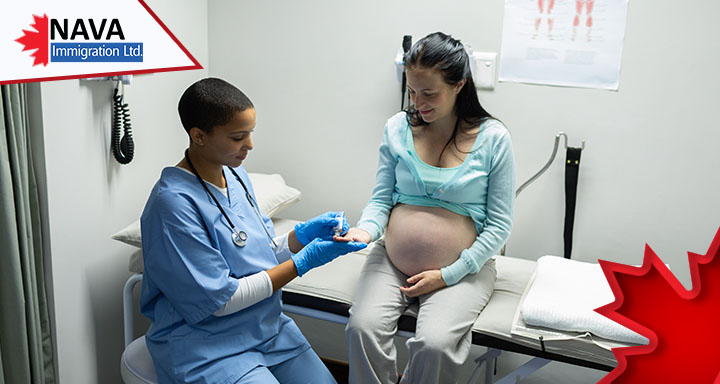Exploring a midwife career in Canada as a newcomer
Do you look forward to exploring a midwife career in Canada as a newcomer? Well then, you must know that now is the best time to consider Midwife jobs in this country because of the significant number of job vacancies. As a result, there is an increased number of opportunities for midwives with international training seeking midwife jobs in Canada. The income levels for midwife jobs are also high, and there is always a supply of career opportunities.
The Canadian Association of Midwives is an excellent place to begin your research. It is a national firm associated with midwives and the midwife occupation in Canada. It offers leadership and promotes the midwife profession as a regulated, publicly funded, and significant part of the core maternity care in all provinces and territories.
Exploring a midwife career in Canada as a newcomer
Moving to Canada by building a career as a midwife – What should you do before moving?
Reach out to the provincial midwife regulatory body where you would like to work in the near future. The regulatory body of that specific province will help you decide the following:
- The evaluation of your international qualifications.
- Adhere to the licensing procedure, costs, and the registration period.
- Bringing the documents for employment purposes and carrying on their education.
- Verification of the document translations and access to Canada’s professional translation services.
- Taking the steps before and after moving to Canada.
After determining the above factors, figure out the official website of the Canadian Midwifery Regulators Council. This official website is for midwives with international information about midwife registration in Canada and the essential competency levels. Next, you can understand Canada’s midwife practice in depth. It is time to learn about the procedures, regulations, and legislations that govern the profession of your province where you settle.
Once you do this, it is time for self-evaluation concerning your language abilities on the website of Canadian Language Benchmarks. Furthermore, work on your language skills, either French or English as the midwife career requires it, based on the province.
You can take admission in language classes while you’re in your home country and continue taking them even after immigrating to Canada.
Midwife career in Canada as a newcomer – What can you expect?
Canada’s midwife occupation is a regulated one, with exceptions like the Yukon Territory, Newfoundland and Labrador, and Prince Edward Island. Regulated provinces often have provincial or territorial regulatory bodies that have separate criteria for entry into this occupation and they grant licenses to eligible people for practicing.
Midwife registration with a regulatory body can access the title of a Registered Midwife. This enables you to perform responsibilities that are limited to midwives through legal legislation. Therefore, it is vital to collect details concerning the registration process before moving to Canada.
Overall midwife job opportunities
Exploring the career requirements
- British Columbia
- Manitoba
- The Northwest Territories
- Ontario
- Saskatchewan
- Nov Scotia
- Alberta
- Nunavut
- Quebec
Credential Recognition
Midwives with international education and training must showcase their skills, expertise, knowledge, and talents of a Registered Canadian Midwife. Therefore, credential recognition analyzes whether international experience and credentials have been evaluated on a fair scale. These credentials will also offer you a chance for an increased salary.
The available Credential Assessment Services
You might access the Credential Assessment Services at the following organizations:
- World Education Services
- Comparative Education Services – University of Toronto School of Continuing Studies
- International Qualifications Assessment Services – Alberta
- The International Credential Evaluation Services
Midwife salaries in Canada
The starting salary of Midwives is around $20 per hour and this can elevate to $65 per hour. The average salary of a midwife in Canada is $54,01 per hour. From the perspective of an annual salary, midwives are likely to earn between $41,600 and $4135,200 every year. The median midwife’s salary is nearly $$112,340.
However, the compensation you receive will rely primarily on factors like experience level, education, and your Canadian destination. In addition, Quebec and Alberta offer the lowest salary prospects based on their hourly rates. Conversely, Ontario and British Columbia offer the maximum salary range.
Which are the best provinces in Canada for midwives to work in?
The job opportunities and perspectives for midwife jobs will differ significantly across various regions in Canada. Typically, midwife job prospects appear to be extremely positive, and the demand for this profession is increasing in various cultures. Despite most Canadian cities offering a varied range of employment opportunities to practice as a midwife, you might access increased opportunities in rapidly growing cities. These fast-paced cities include Edmonton, Calgary in Alberta, and Ontario.
When searching for midwife jobs, individuals must look toward smaller towns or cities near the target city. Moreover, smaller areas might be willing to provide an increased salary to hire you as an employee.
Exploring a midwife career in Canada as a newcomer – How to get your first job?
Midwives are in high demand in this country compared to other countries, and most cities have high-end job prospects for aspiring midwives. However, the overall job market in Canada is competent enough, and it is crucial to make arrangements to acquire a job. Finding your first job in this country might be more challenging than in your native country.
You can search for numerous opportunities to practice as a midwife in Canada through the following ways:
- Seek a mentor in the midwife sector in the form of a retired midwife, offering valuable experiences and knowledge. They might also help you in expanding your professional network.
- Become a part of the healthcare job search or networking clubs with the help of immigrant-serving consultancies.
- Participate in industry fairs and continue checking online job boards consistently.
- Know about the colleges and associations with a job bank and can assist with a commercial job site.
Emphasis on skills to fulfill midwife requirements in Canada
Canadian employers have an eye for soft skills, indicating your personal characteristics that boost your interactions, job performance, and overall career options. These are contrary to one’s hard or technical skills, and you can apply them in an interview. However, your soft skills will help you attain the job successfully.
If you’re more prone to working in the private sector, you will need to demonstrate excellent business and administration skills. These could recruit staff members and maintain records. In addition to these, they must also showcase expert knowledge on risk management and medico-legal issues.
Midwifery is not a very old profession in Canada; as a midwife, you must be able to impart your knowledge to the public. You will have to be prepared for the challenges that are likely to arise in this new profession in terms of integrating within the healthcare system.
Midwife Regulatory bodies in provinces
Here’s a breakdown of different provinces with their regulatory bodies:
- British Columbia College of Nurses and Midwives -B.C.
- College of Midwives of Alberta – Alberta
- Saskatchewan College of Midwives – Saskatchewan
- College of Midwives of Manitoba – Manitoba
- College of Midwives of Ontario – Ontario
- Midwifery Regulatory Council of Nova Scotia – Nova Scotia
- Midwifery Council of New Brunswick – NB
- Northwest Territories Health Professional Licensing – Midwifery
Professional networking for immigrants
Professional immigrant networks are member-driven associations or networks run by volunteers and established by and for immigrant professionals. They aim to:
- Develop a forum to enhance their contribution level toward their communities.
- Offer opportunities for their members to acquire valuable employment and acquire their professional objectives.
Activities provided include opportunities related to mentoring, professional development, and networking events. You will also have the opportunity to make more connections and acquire job opportunities. For instance, newcomer professionals can achieve holistic economic and social integration in Nova Scotia through the Immigrant Services Association of Nova Scotia. Furthermore, in Ontario, new immigrants can tap into resources, including Professional Immigrant Networks (TRIEC).
Exploring a midwife career in Canada as a newcomer through midwife schools in Canada
Most immigrants pursue higher education after arriving in Canada, while a few of them switch their professions or attain a degree in MBA or PhD. There are numerous Canadian universities that provide midwifery programs to candidates. In addition, every program has separate exams which fall under the provincial regulatory bodies. Overall, the programs and courses will differ from one another to an extent. Individuals can consider the following schools:
- Laurentian University – Sudbury, Ontario
- McMaster University – Hamilton, Ontario
- Metropolitan Toronto University – Toronto, Ontario
- University of British Columbia – Vancouver, British Columbia
Resume tips for midwife jobs
With the increasing competition in the Canadian job market, you must focus on resume writing so that you can stand apart from the crowd. A CV is one of the crucial components in your midwife job search. You will use the resume as a marketing tool to highlight your accomplishments, education, and work experience. The first step in your job search is to create a strong resume with a well-written cover letter. Your objective is to write an excellent, impactful resume showcasing your relevant skills and experience. Doing so should bring a sense of curiosity to the employer when interviewing you. In short, your resume must be able to emphasize the specific skills, achievements, and experience that will be fit for a midwife job role.
Practice writing several drafts for your resume and work on your format to easily highlight your solid skills and career objectives.
Valuable tips to crack your Canadian job interview as a midwife
Follow the below key points to crack your job interview in Canada for a midwife job role:
- Check your potential employer’s website to learn more about them, their organization, their key size, priorities, and additional information.
- Connect with other midwives to understand the strong and weak points of the profession.
- Take the job description very seriously, as it will help you understand the roles and responsibilities of that specific firm. Try to analyze the similarities and differences between the job description and your work experience.
- Take your time to assess the reason behind your choice to work in this specific field at a specific firm. HR managers would like to know the reason behind your choice to join their organization.
Key questions for a midwife job applicant
Given below are a set of standard questions that you will need to answer in an interview for a midwife job role:
- Describe the strengths of being a midwife.
- What are the essential attributes of being a part of the maternity team?
- How do you stay updated with the best practices in the midwifery field?
Common topics to ask questions at the end of the interview for a midwife role
- You must ask about employee professional development to depict that you are keen on learning new skills.
- Ask about their company’s work culture to show that you prefer working in positive and motivating teams.
- Ask about the current challenges of their organization to show that you wish to contribute by solving the bigger problems and that you wish to work there in the long term.
Before actually going for a real interview with a Canadian employer, you must have a practice interview with an experienced professional midwife. These are referred to as informational interviews, and they give you insights into the current practices of the profession and other intricacies.
Our immigration representatives at NavaImmigration have immense knowledge related to Canadian immigration. To clarify your doubts or queries, you may write to us at [email protected].





